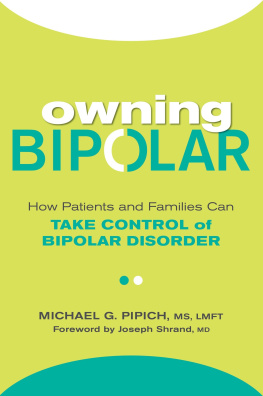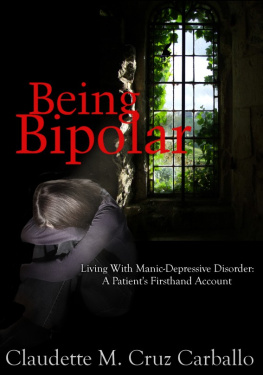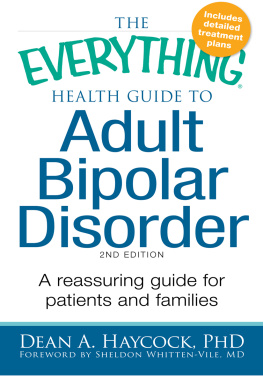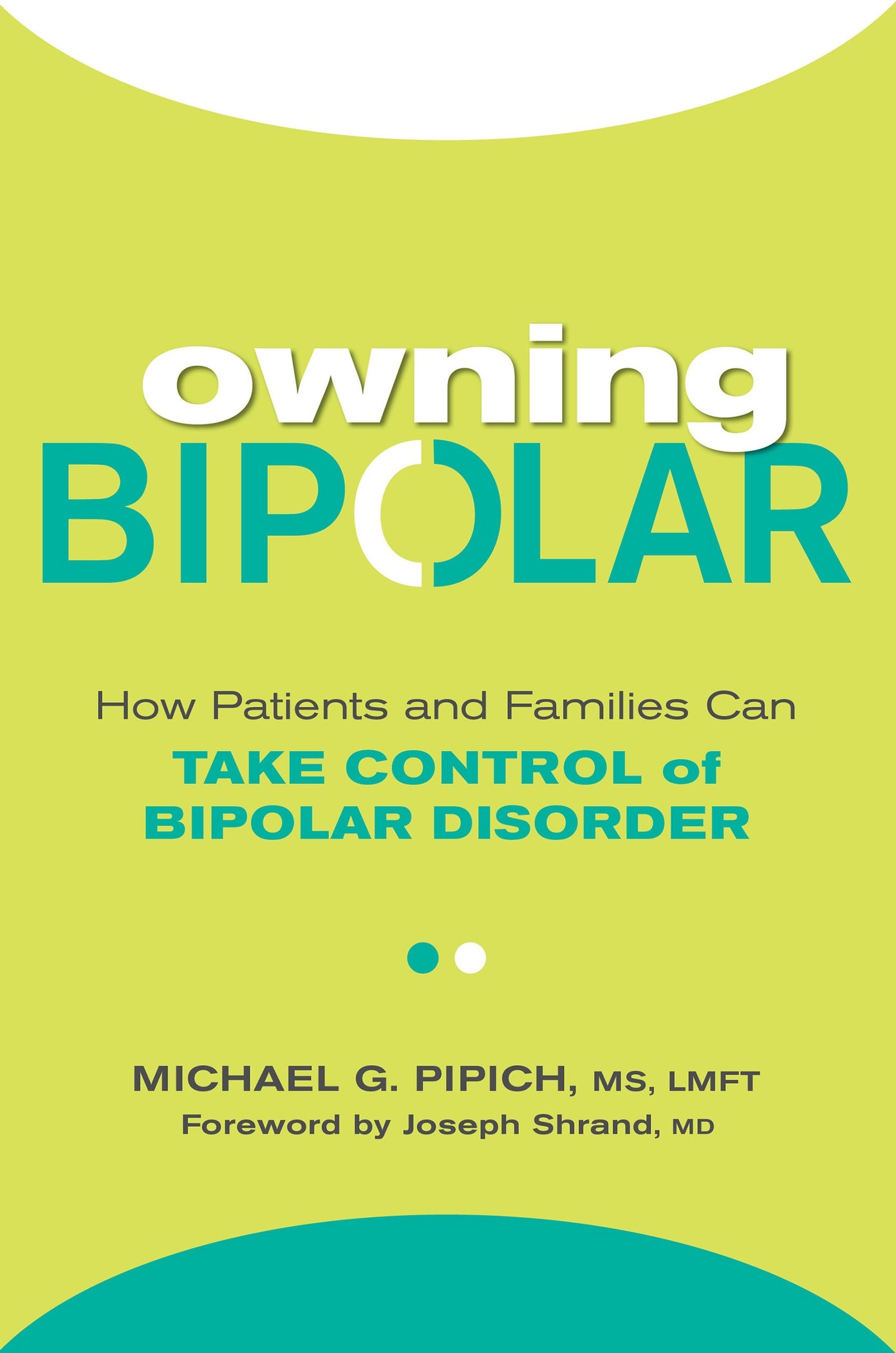Acknowledgments
I VE BEEN ABUNDANTLY BLESSED WITH people who share a passion for healing those afflicted with bipolar disorder. Please honor with me these tremendous individuals who have helped make this book possible.
Jane Pipich, my intelligent and perceptive wife, who spent many hours with me reviewing this book, and who along with my sons Adam and Kevin, fuels me with daily love and support.
Denise Silvestro and the entire Kensington Publishing team, who have warmly welcomed me into the Kensington family, and have embraced this project with every attention to detail, so that Owning Bipolar can touch as many lives as possible.
Steve Harris of CSG Literary Partners, my enthusiastic agent, whose professionalism, tenacity, and positive energy leads to amazing results.
Howard Baumgarten, LPC, a master psychotherapist and owner of Smart Practice Central, who assisted in the bipolar disorder program development with great insights into mental health practice logistics, marketing, and speaking engagements.
Janet Appel, of Janet Appel Public Relations LLC, who has been incredibly gracious in providing encouragement, idea development, and media connections.
Laura Stack, the Productivity Pro, a prolific, bestselling business author and keynote speaker who provided her professional guidance in authorship with regular infusions of pure optimism.
Barbara McNichol, of Barbara McNichol Editorial, who worked diligently with me on the original manuscript, was always available to collaborate, and is completely committed to her authors achievements.
Julie Corbett, MBA, of Authentically U Marketing, who has been relentless in promoting our mutual vision of mental health in Colorado, and who has offered valuable feedback on this project.
Katherine Claytor, MA, who encourages from a profound faith and whose input on the original draft of this book helped balance the technical information with a personal sensitivity to the reader.
Joseph Shrand, MD, a brilliant and deeply compassionate psychiatrist and author who, in addition to his distinguished professional appointments, is the award-winning author of Outsmarting Anger: Seven Steps for Defusing Our Most Dangerous Emotion, and Do You Really Get Me? as well as the founder of Drug Story Theater: Where the Treatment of One Becomes the Prevention of Many . He has graced us with the foreword for this book, and is simply an inspiration.
My devoted parents and all the teachers, professors, and mentors whose wisdom is never forgotten through the years.
And finally, I am forever grateful for all those who have generously shared their bipolar stories with me. Thank you to all who have submitted to BipolarNetwork.com and the Bipolar Network Facebook page, several of whom are quoted in this book. Other content originating from my thirty-plus years of mental health practice is the result of composites from various real and altered patient scenarios, along with identity changes. No matter the source or circumstance, I am deeply moved by those who have shared a part of themselves so that others may benefit.
CONCLUSION
Going to the Next Level
T HE PRECEDING CHAPTERS BROKE DOWN bipolar disorder into its many partsfrom its historical, genetic, and neurological foundations to how it manifests itself in manic and depressive symptoms, and then finally to how individual and family treatments progress through the three phases of bipolar therapy. Examining these components not only serves our knowledge on the subject, it replaces fears of misunderstanding and ignorance with a newfound confidence based in the pursuit of truth.
Congratulations! You have learned much and have become a true expert in owning bipolar. Now its time to graduate to the next level. The Greek philosopher Aristotle is credited with saying, The whole is more than the sum of its parts. That means we piece together all the parts of what weve learned to produce something bigger and better for all. For our purposes, two components of success reside in the greater whole of owning bipolarthat is, personal action and helping others.
Personal Action
Our elevated awareness and knowledge require that we take action. Ideas are lifeless without our passionate pursuit for change. Owning bipolar isnt simply an internal activity of acceptance. Its meant to reach forward to do what we need to accomplish outside ourselves. It isnt only accepting the truth about bipolar, its about assertively living that truth for ourselves and for those around us.
And what is always said about the truth?
It hurts.
It will set you free.
Reading this book, you may have thought about an important truth you painfully struggle to facesome avoided truth that has kept you chained in fear. It could be a truth about yourself, about someone you know, or both. You might have felt inadequate because of the initial lack of knowledge.
Ignorance no longer rules you. Maybe youve feared your loved ones denial. But now you can tackle the uncertainties that belie it. Perhaps youve delayed confronting bipolar because youve worried about alienation or condemnation. But you dont care about those things anymore because youre emboldened to save someones life. And the life you save could be your own.
Helping Others
That leads to the second componenthelping others. With your knowledge, empowerment to change, and full bipolar ownership, you can help someone in the future whos struggling with mental illness. Trust me, it will happen. It wont matter how open or private you are with your own story. Too many people in the world are suffering silently, aimlessly, and in isolation, just as you have.
Owning bipolar changes you into a more empathetic person of action . While youre fully accountable to your own mental illness, no longer can you ignore suffering around you, especially when its presented in subtle ways. The highest level of bipolar ownership is carrying forward your wisdom to those who need it. Be assured they will tell youone way or anotherhow desperately they need your guidance.
Society values individual freedom and an individuals right to privacy. Thats good, of course. But there are times when youll witness a type of communication from another persondirect or indirectand recognize it all too well. Its a reaching out from someone who may indeed sense your ability to manage truth surrounded by fear. Perhaps a neighbor gently complains about living with an emotionally troubled adolescent. Or perhaps a coworker is displaying uncharacteristic behavioral changes in your presence. Or out of the blue, a complete stranger needs a sympathetic ear and seeks your confidence to reassess his or her direction. Embrace these sudden, often fleeting chances to listen, share, and guide. Maybe you can provide understanding, comfort, or even a professional referral. But no matter the circumstances, you will be prepared for the moment.
As you cross paths with people who can benefit from your understanding and inner strength, you will experience the greater whole with each person you touch. And in each precious moment, you will renew your commitment to owning bipolar in your life. As they reach out to you, youll discover that embedded in every cry for help is the opportunity to share a single truth that has set you free.
Dont be afraid, you will say. You are not alone.
Notes
Aristotle. (1896). Metaphysics. (John H. MMahon, Trans). London: George Bell and Sons. (Original work published in 350 BCE).







